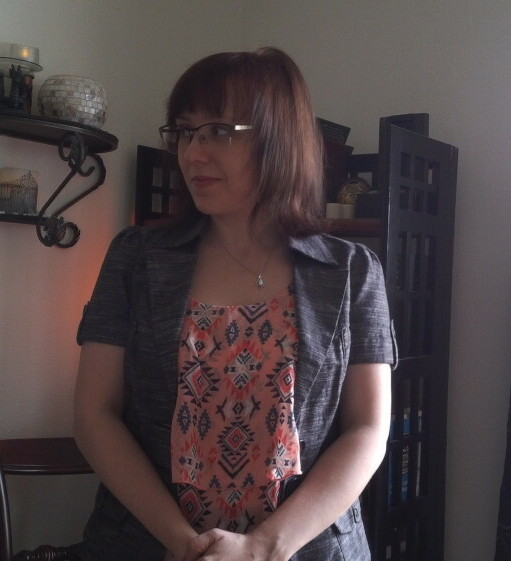Welcome to Reimagine Devotion!

It has been a long-coming dream of mine to open the doors on this site, a space dedicated to reimagining biblical interpretation and rephrasing it for the needs and expectations of the modern world.
My name is Shanna Terese Bude. I am the daughter of a United Methodist minister now happily retired with his life-long partner in ministry, my mother. At some point in my twenties, I ended up in seminary, like him. In my thirties now I have ended up in the pulpit, something everyone in my life, it seems, has just been waiting for me to get around to since… forever.
It’s been a long and circuitous journey with the finish line still nowhere in sight. The job I went to seminary expecting to pursue is, it turns out, something for which I have neither interest nor talent. Since that discovery, I have been underemployed in a “for the time being” job in retail – now going on seven years. Do I regret any of this? To be honest, no.
Because one thing has become clear to me: Things happen when they are meant to. There is no forcing them earlier, and no avoiding them once the time has come.
But Why This Site?
Reimagine Devotion has come about for much the same reason I have now ended up in the pulpit: because people keep insisting I should do it.
On this journey of life and faith, through a combination of who I am (genetically, I think), how I was raised, and what I have chosen to study over my long academic career, I have come to a certain understanding with the book that lies at the heart of all Christian conflict, both inside and outside the Church – Scripture. The ancient library of documents known simply by the Greek word for a book: “the bible.”
I say I have come to an understanding with Scripture. Not of. With.
Yes, the grammar checker is fighting me over the phrase “understanding with Scripture.” But it is indeed what I mean to say.
Because fundamental to this understanding, I believe the bible is very much a living thing, “God-breathed” (2 Timothy 3:16) into existence just as existence – life – was first breathed into Adam by God even before the Garden of Eden (Genesis 2:7). As a child, perhaps ten years old, I remember scribbling in the margin of my bible: “Might every verse written in the bible mean something new to [contain some new insight to be discovered by] each person who reads it?” All of my studying and questioning and praying has strengthened that ten-year-old’s original insight.
God is living.
God is Life.
Any document inspired by the Source of Life must likewise be alive.

As I see it, ours is not to understand or analyze the One True Meaning of Scripture. Ours is to grow with, progress with, journey with the living spirit breathed into Scripture by our own Creator. Ours is to grow with Scripture into new and ever fuller understandings.
People tell me my understanding with Scripture is unique. I express it to them – not directly, but in sermons, in conversations with friends – and they are impressed. They say that it’s interesting, that things make sense now, that it makes them think, that I should say more…
So yes, that’s why Reimagine Devotion exists, because I’ve been told so many times that I should say more.
A Background of Words and Reason
At my heart, I am, in this order:
- A storyteller
- A linguist
- A scholar
Number 1 I get from my father, the creator of fantastic bedtime-story worlds in which little girls befriend talking fish, and learn the eternal lessons of courage and generosity, empathy and persistence, along the way.
Number 3 is the unavoidable consequence of being raised by two highly rational people devoted to the pursuit of individual knowledge through thorough examination of all available evidence.
In other words, my parents encouraged me, above all else, to think for myself, reach my own conclusions, never just accept what I was told at face value, and prepare to defend my opinions rationally. We are people who think before speaking and study before making decisions. We are people to whom God is, as described in the Gospel of John, Logos – the Greek term for a rational thought, word, or matter. The Greek logos is where we English speakers get our word logic. Over two thousand years, the meaning, logos/logic, remains essentially unchanged.
Number 2 is, I think, where numbers 1 and 3 meet, the intersection point between scholarship (logic) and storytelling (imagination), both endeavors dependent on words.
In this intersection between scholarship and storytelling, tied together by language, we also find history. History is a uniquely human concept and organization of time – no other known creature has the ability to organize events into past/present/future. History is the ongoing story of humanity told for a purpose – the hope that we will come to a better understanding of ourselves and our place in the universe. History also depends on language. There is no way to communicate this organization of time without words.

I supposed it only makes sense, then, that I ended up with the educational background that I have. I have undergraduate degrees in (1) History and (2) Foreign Languages, for which I studied Latin, Classical Greek, Homeric Greek, Coine Greek, German, Spanish, and (though not technically for the degree itself) Italian. In graduate school, I studied Hebrew while pursuing my two Master’s Degrees in (1) Christian Education and (2) Theological Studies, with an emphasis on the History of the Early Church.
Since graduating, I have memorized whole chapters of the bible in Hebrew and Greek (I mean, I had to do something to stave off boredom while working eight-hour shifts as a Goodwill sales associate, right?)
These threads, scholarship and words, history and story, bind me together as a person. These threads, also, wind together my understanding with Scripture.
A Living Faith Journey
The bible is not a list of things. It is not a static recitation of stories and rules and facts to be memorized and followed verbatim. Frankly, anyone who has actually read “the book” knows this cannot be the full story. A To Do Manual for Life would be presented in a very different format (it would actually be a manual or to do list, for example). Some will find this revelation unsettling, even destructive to the foundations of faith. Rest assured, I went through that faith-shaking moment too. I came through it to see the deep beauty and complexity of a living document that defies human explanation and transcends human comprehension.
There are a lot of “geeky” details that go into understanding the bigger picture of bible. As I told my congregation just the other Sunday, you do miss a lot of the meaning in the bible if you only read translations. A lot of the deep and profound beauty in the bible is its wordplay, the ideosynacrcies of the Hebrew and Greek languages that cannot be translated.
Likewise, the bible is often incomprehensible without at least a basic understanding of the context – the history and culture – of the people who originally wrote it. Yes, God inspired the bible (see the meaning of theopneustos in 2 Tim 3:16). But it was still written down by humans in words that made sense to those humans in their own times and circumstances.
A lot of people acknowledge these things, the importance of the original languages and of cultural/historical context. This is, I believe, the line that separates harmful, even oppressive methods of interpreting Scripture from beneficial ones. The truth is, everyone interprests. There is no such thing as just reading Scripture and taking it at its word. There are, simply put, too many words, too many writers, and too many years for that to be possible. Everyone interprets. How we interpret matters.

This is what must be “reimagined.” Not faith itself. Not God. Not even Christianity as a religion. But how we express these things in the modern world – in other words, how we live out our devotion today, in our real, for better or worse modern (and even postmodern) lives. We must reimagine how we communicate the ancient truths just as living and active in Scripture today as two thousand years ago. We must be allowed to discover things for ourselves, which means that no honest question is out of bounds.
Above all, we must allow Scripture to be what it is, an imaginative collection of living documents all bearing witness in their own unique way to the ongoing promise of a faith rooted in the one true Word of God, Jesus Christ, God incarnate.
Scripture is alive, and we must let it live.
Faith Is a Journey
Like all journeys, faith requires dedication. It requires both study and application. It requires a basic desire to grow in knowledge and move forward in life.
My own journey in faith has brought me to an understanding with Scripture that I have been told us useful, helpful, filled with the “geeky” details many people do not have time to study on their own – something I should say more about.
So, here I am, saying more about it.
